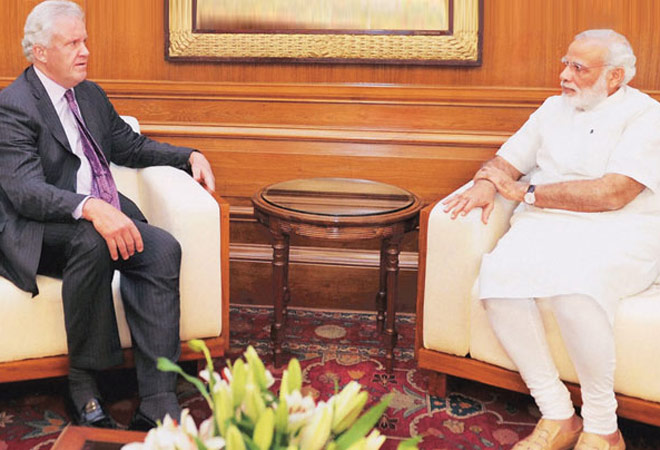GE’s Immelt meets Modi, wants to ‘Make in India’
GE has for a long time been negotiating with the government for setting up a rail engine factory at Marhowra in Bihar.
PMO officials told Financial Chronicle “Immelt had come with specific investment plans and proposals before the prime minister”.
The chairman and CEO of General Electric Jeff Immelt on Monday said that there were only minor regulatory niggles which was holding up further investments by the multinational in India including those in nuclear energy. “Prices need to go to levels that will justify the investments needed in the sector…if the tariffs don’t change you won’t get the kind of reinvestments that this country needs…There is no magic wand”.
Modi past year set out an ambitious plan to revive Indian industry by wooing foreign companies with the promise of making it easier to do business, to create 100 million jobs and raise the country’s global competitiveness. “We see 4-5 big projects for GE that could change the face of the company.in railway modernisation, in healthcare, power generation and military aviation”, he said. “I see more big opportunities now than ever before”.
Immelt is looking forward to a positive investor environment in India.
The comment indicates that suppliers’ concerns over the law linger and that an agreement in January between US President Barack Obama and Prime Minister Narendra Modi has had little success in assuaging them. Immelt remarked that India’s speedy evolution into an attractive manufacturing base is something General Electric Company (NYSE:GE) can not afford to disregard.
The “Make in India” programme was “quite material” to GE and it expands opportunity for the company more than in the past, he said. This unit generates around $6 billion revenues annually and is growing at around 20%.
“The world has an established liability regime … it has been accepted and adopted …”
GE entered India in 1902 with the country’s first hydropower plant and already manufactures goods ranging from aircraft engines and wind turbines to medical imaging machines and freight trains.
Asked about enforcement of contracts in India, Immelt said he did not see it as a problem and cited his company’s experience with Dabhol, where it took time but the contractual obligations were met.








